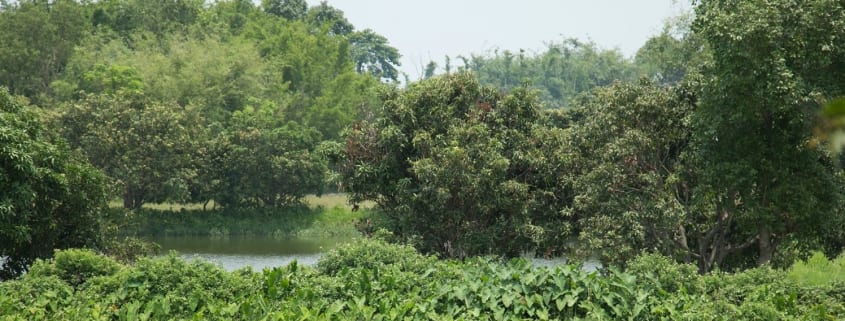Conservation Organizations Purchase Critical Properties for Wildlife in Nepal
Rainforest Trust is pleased to announce the purchase of five parcels of vital riparian habitat in partnership with KTK-BELT and International Conservation Fund of Canada (ICFC). The acquired properties lie next to Koshi Tappu Wildlife Reserve in Nepal, and their purchase will fortify and expand the country’s first and largest Ramsar Convention on Wetlands of International Importance site.
Koshi Tappu Wildlife Reserve, with a new expanded total acreage of 42,560, provides habitat protection for numerous globally threatened species, including six species of vultures – four of which are Critically Endangered – as well as the Critically Endangered Red-crowned Roofed Turtle and Bengal Florican. With 485 recorded bird species in this small reserve, it is considered one of the most important aquatic bird reserves in South Asia.
“Rainforest Trust is proud to partner with KTK-BELT and ICFC to strategically acquire 40 acres of threatened woodland and wetland habitat and expand the spectacular Koshi Tappu Wildlife Reserve,”
said Rainforest Trust CEO Dr. Paul Salaman. “This additional habitat protection helps numerous endangered wildlife species, like the Ganges River Dolphin and the Red-crowned Roofed Turtle.”
The expanded reserve section includes an important forest that is vital for the Critically Endangered nesting vultures. In the last 20 years, forest cover has declined by more than 80 percent in the Koshi Tappu ecosystem, reducing these nesting sites in particular. This expanded security also prevents land-grabbing in this sensitive buffer region, and provides increased defense against invasive weeds, wildlife trapping and overfishing.
The completion of this project will assist ongoing efforts by other institutions and nongovernmental organizations currently working to double the size of Koshi Tappu Wildlife Reserve due to its ecological importance.
Another crucial aspect of this purchase is that the parcel is located in the south of the reserve, where conservation efforts have been challenged due to a lack of community engagement, stemming from discrimination the community has historically faced. Our local partner worked closely with the communities surrounding this new protected area to increase education about the importance of conservation, and they provided valuable alternative livelihood opportunities such as vulture eco-tourism, Ganges River Dolphin viewing areas and bio-brick production using harvested invasive plant species as a benefit to the local populations.
Through the generous support of our friends around the world and the SAVES Challenge, this project is a success.




